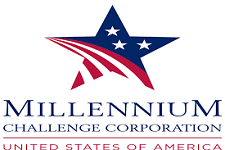The Millennium Challenge Corporation’s (MCC) Vice President of Compact Operations, Fatema Sumar, united with private sector, development, and investment leaders in the nation’s capital March 17 to examine how capital flows are underpinning Africa’s energy transition at the 8th Edition of the Powering Africa Summit.
Sumar joined John Irons, Deputy Coordinator for Power Africa, as well as members from the U.S. African Development Foundation, the U.S. International Development Finance Corporation, and the U.S. Department of the Treasury at the Summit’s plenary session to discuss how to successfully mobilize finance into Africa’s energy projects.
“In developing countries, one of the major obstacles to reducing poverty and creating sustainable economic growth is an insufficient, unreliable, or unaffordable electricity supply,” said Sumar during her panel discussion. “Nearly one billion people around the world lack access to electricity. This stifles investment, increases costs of goods and services, and often forces families to seek electricity sources that are expensive and environmentally unfriendly.”
To help address this, MCC is deploying significant resources in partner countries like Ghana, Senegal, and Benin toward grid capacity, modernizing grid management, and attracting private investment. Roughly two-thirds of the agency’s more than $15 billion in global investments have been on the African continent, but MCC cannot meet Africa’s development needs alone. Africa has one of the fastest growing middle classes in the world, growing more than 30 percent over the last 30 years. This has dramatically increased consumer demand and, in turn, the need for modern energy solutions.
“International cooperation is absolutely critical to ensuring we meet Africa’s development needs,” added Sumar, “and Power Africa plays a key role in facilitating that coordination for the United States.”
Power Africa is one of the largest public-private partnerships (PPP) in the world. It brings together bilateral and multilateral development partners, along with U.S. government partners, to engage with private sector stakeholders from the entire project development arc with one goal in mind – ending energy poverty.
With the aligned goal of ending poverty, MCC and Power Africa have a long track record of working together. MCC is the U.S. government’s largest contributor of power infrastructure, policy reform, and PPPs under Power Africa. Of the more than $9 billion it has invested in Africa, MCC has committed nearly $2.5 billion to date in grants designed to improve the access, quality, and reliability of electricity.
In Benin, which has among the world’s lowest levels of per-capita electricity consumption, MCC and the Government of Benin are implementing the $391 million Benin Power Compact with the goal of modernizing Benin’s electricity sector by strengthening national policies and institutions, expanding grid capacity, modernizing grid management, attracting private investment into solar power generation, and increasing access to electricity for poor households.
Through PPPs, MCC is delivering clean, renewable solar power to families and business in Benin through off-grid solar kits, reaching more than 60,000 Beninese to date.
“Before there was no kit, we used oil lamps and phones [for light],” said Tchibozo Djaba-Djaba Florence, a high school student in Benin. “But now with the kit, my sisters and I can review our lessons [after dark]…the kit also includes a radio and a portable charger.”
MCC’s compact with Benin has the potential to leverage $100 million in private investments and deliver electricity for the first time to nearly 630,000 people in the poorest areas of Benin.
This transformative impact is not unique for MCC. Since inception, the agency’s power projects have positively impacted millions of Africans through other grants, including rehabilitating Liberia’s Mt. Coffee Hydroelectric Plant and Mawali’s Nkula A hydropower station.
As is the case with other partner countries, a primary area of focus for MCC’s Powering Africa projects continues to be climate change and investing in climate-related infrastructure.
“Climate change is a defining issue of our time,” said Sumar. “We [MCC] are stepping up our efforts and have made a commitment that more than 50 percent of our programing funds will go toward climate-related investments over the next five years.”
The Millennium Challenge Corporation is an independent U.S. government agency working to reduce global poverty through economic growth. Created in 2004, MCC provides time-limited grants and assistance to countries that meet rigorous standards for good governance, fighting corruption and respecting democratic rights.

